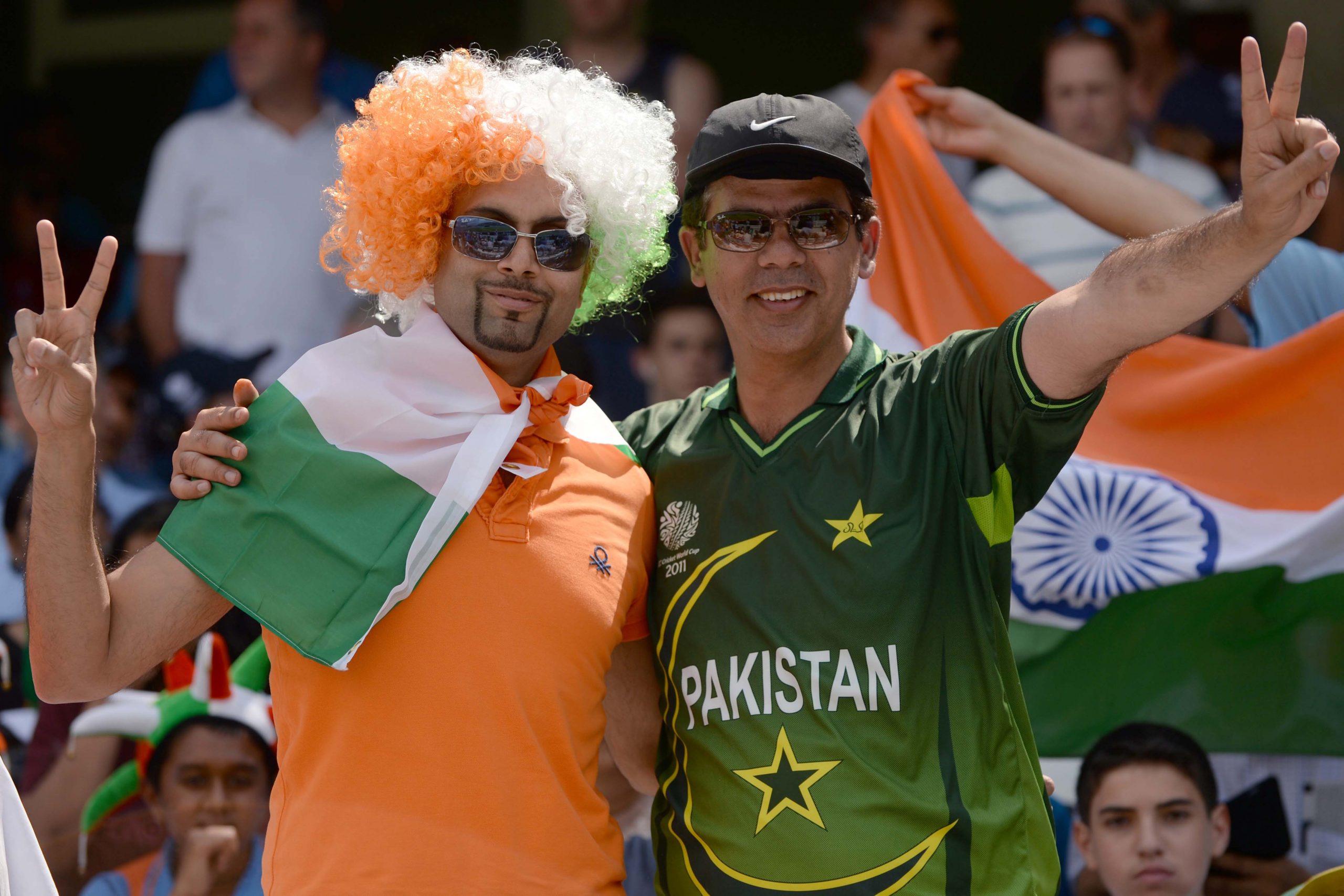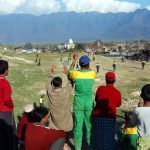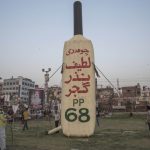The India-Pakistan cricket rivalry in the UK
The greatest rivalry in sport, India versus Pakistan, is further fuelled by the divisive politics of the two Asian countries. For expats trying to assimilate in the UK, it has a different meaning.
Author:
14 June 2019

Asma Ajaz-Ali’s headscarf makes her stand out at the Shree Hindu temple near Birmingham’s city centre. A Muslim woman born to Pakistani parents from the volatile Azad Kashmir region, people who look like her are not often seen in this particular place of worship.
However, she feels nothing but warmth as she is surrounded by a sea of smiles. She is respectful of the customs that govern this house even though she is not here for prayer. Ajaz-Ali is a cricket coach, working with the England and Wales Cricket Board (ECB) as part of the All Stars Cricket programme designed to build bridges and help spread the game to inner-city communities.
“It melts my heart to be welcomed with such love by people who are from different backgrounds to me,” Ajaz-Ali told New Frame. “We can use cricket to connect people. Friendships are created between Hindus and Muslims through this game and the children don’t care where you’re from or what your ethnicity is. As long as they can play and have fun, that’s all that matters.”
This festival of culture and cricket was launched in April, sandwiched neatly between a suicide attack carried out by extremists that killed 40 Indian military personnel in Pulwama, Kashmir, in February and the highly anticipated ICC Cricket World Cup clash between India and Pakistan in Manchester, England, on Sunday 16 June.
The rivalry between these two cricketing powerhouses is the biggest and most intense in all of sport. Not even the football feud between Brazil and Argentina comes close. In terms of numbers, the South Asian giants loom large with more than 1.5 billion people, equating to more than 20% of the world’s population, encompassed within the two nations. Cricket in this part of the world is a religion. It is an obsession that consumes daily life and moves vast swathes of people like so many leaves caught in a tumultuous current.
And that is before you extend your gaze to the boundary. Since the partition of Pakistan in 1947, the two countries have waged four officially recognised wars with numerous insurgencies, skirmishes and border raids adding to the uncountable casualty list.
A volatile environment
Since February, India has lurched further to the right on a jingoistic wave cultivated by Prime Minister Narendra Modi’s dog-whistling and quasi-fascistic policies. Over in Pakistan, Imran Khan, the 1992 Cricket World Cup-winning captain and now his nation’s prime minister, continues to be soft on fundamentalists as tensions mount on one of the most militarised borders in the world.
Former players and politicians on both sides have called for the game to be boycotted. Captains Sarfaraz Ahmed and Virat Kohli have been asked to act as statesmen though neither have risen to the endless baiting of headline-grabbing journalists. Indian wicketkeeper MS Dhoni was rapped on the knuckles by the International Cricket Council (ICC) for sporting an insignia of his country’s special forces, prompting a backlash back home.
Related article:
All the while, official reports indicate that more than 400 000 people applied for tickets for Sunday’s game taking place in a stadium with a 26 000-seat capacity. Unofficial reports have revealed that tickets are being sold on the black market for £1 000 (just under R20 000). This is a powder keg. One spark and it could all explode.
Watching all this unfold from a distance have been the more than two million people of Indian and Pakistani origin now residing in the United Kingdom. Some are new arrivals trying to assimilate in a foreign land while remaining tethered to the country they left behind. Others are natives, the children and grandchildren of pioneers who set sail and lay foundations long ago.
Included in this second group is Tasneem-Summer Khan, senior adviser to the United Nations Special Rapporteur on the Right to Health, who was born in New York but raised in the small Essex village of Holland on Sea by Pakistani parents. Her earliest memory was the sight of Pakistan’s World Cup victory in 1992 and the joy it brought her family. Since then, she has committed her spare time to playing cricket as well as running a blog called Girls With Cricket Balls. She is a regular voice on the online commentary stream Guerilla Cricket and is an ardent advocate for the development of associate cricket.
How the rivalry affects expats in the UK
However, because of her ethnicity, she is often questioned about her allegiance. “One of the first things people do when they find out about my identity and that I love cricket is Tebbit test me,” Khan said, referencing the controversial proposition, put forward by former chair of the Conservative Party Norman Tebbit in 1990, that said ethnic minorities should be quizzed on whether or not they supported England as a sign of their willingness to assimilate.
“It’s unfair,” Khan said. “Cricket is a means of retaining a part of your cultural heritage. For me, it helped me be accepted in England and made me feel a part of the society. I simultaneously feel English and Pakistani. This questioning puts pressure on all people of South Asian origin and forces them to be something more than just a fan. You have to represent something whether you like it or not. Given the fervour that has been generated, this adds fuel to the fire.”
Khan said she feels embarrassed by the animosity. She explained how even rational expats can suddenly become antagonist. “I was watching the 2015 World Cup game [which India won by 76 runs] with friends from both countries and we started off sitting next to each other and sharing our love for the game,” she said. “But by the time things got tense, everyone was divided and sitting on opposite sides of the room. It got nasty, with people saying ugly things to each other. This game does strange things to ordinarily balanced and intelligent people.”
Related article:
At the Under-15 World Cup final contested at Lord’s in 1996, fans exchanged blows on the field after India’s victory. In the lead-up to the 1999 World Cup – during which the teams squared off in Manchester – the police were called to intervene in a flare-up of violence when a player was assaulted with a bat in a match between Hindu and Muslim teams in Leicester.
Caught up in the maelstrom are the players. Almost every team in England’s County Championship is represented by players of South Asian origin. Jigar Naik is one of them. Born in Leicestershire to an Indian mother, he grew up pretending to be one of the great subcontinental spinners that he worshipped.
‘An attack on one community is an attack on us all’
In 2006, he became the first Leicestershire-born Asian to represent the county. Through his experience of sharing a dressing room with players from around the world, including Pakistan’s Shahid Afridi, Mohammad Asif and Mohammad Abbas, he soon found his worldview broadening.
“I grew up identifying with the Indian national team and would support them as a boy,” said Naik, who is now Leicestershire’s spin bowling coach and helps run a programme called Chance to Shine Street, which brings together children of all ethnicities. “But when I turned professional, I realised that I was first and foremost a cricketer and my Indian identity on the field became less important. I never felt extra motivation to get out the players from Pakistan and there was no special rivalry on the field. I just wanted to get the best players out.”
Naik’s experience in the melting pot of the professional dressing room emphasises the power of living cheek by jowl with people from different backgrounds. All three people interviewed for this piece spoke of the union they share with neighbours, colleagues and friends who also identify as South Asian.
“All the Asian communities feel like kindred folk here in the UK,” Ajaz-Ali said. “Only in the gangs of young boys decades ago would people divide themselves and feel the need to overtly display their regional differences. We all shop together and eat together and live together.
“We are treated as one homogeneous group by other cultures here. An attack on one community [by right-wing extremists] is treated as an attack on us all. We mix together in ways that people back in Asia do not. India and Pakistan used to be one country, one people. Here in the UK we feel that connection and that helps bridge the divide.”
Ajaz-Ali continued: “Cricket is the thing that brings people together more than any other. Food, music, dress; there are similarities in other aspects of life but there are differences also. No matter where you go, the rules of cricket remain the same and the contest between bat and ball transcends all barriers.”


